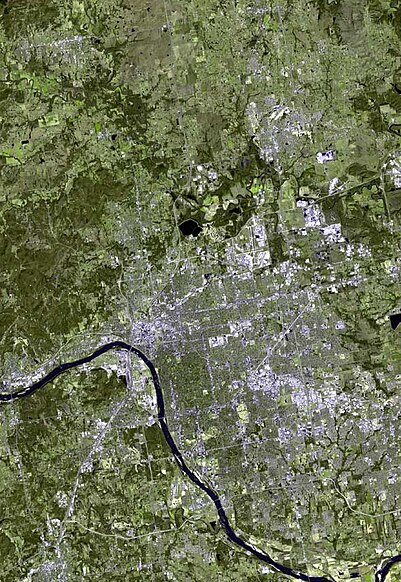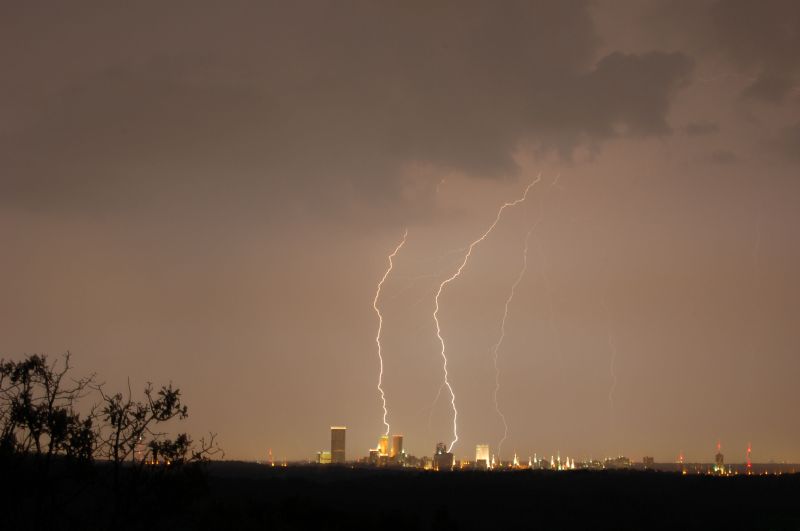.
Again I slid up over the horizon
and the lights of Tulsa spread flat out before me.
"Ah, there you are," I said,
"like a porch light left on
for almost thirty years."
..............................
Ron. Yes, the lights are on for you and anyone
else who wants to rush toward me in a stream of light,"
the awakened city said, "but I knew
it was you. Who else would talk to me like this?"
I said, "There always was this special thing between us,
no?"
....."Between you and me,
not between me and you. You're like the rest,
you think you're the only one to come along, that
I was made for you."
..........................."I know, Tulsa, but
remember, I was an only child."
..............................
you're not a child now, so why act like one?
Why don't you settle back and take a deep, long look
at things the way they are? Why not just let go
of your love-hate thing with me? Do you really need
this longing and regret and so much useless anger?"
"But what'll I have of the me who was a little boy?"
"Whatever you already have, no more, no less,"
the voice said evenly.
............................ Suddenly I cried
into the dark, "Where's your mouth?"
"You don't know? It's all around you -- "
......I was pulling
into the driveway where I used to live
........"It's your skin"
and opened my eyes and was
here, in New York, typing these lines.
Cain's Ballroom in Tulsa, Oklahoma at night: photo by strph, 2006

Tulsa, Oklahoma from space: satellite photo by NASA/USGS; image by terraprints, 2006

Gas station and garage converted into a nightclub, Tulsa, Oklahoma: photo by John Vachon, October 1942 (Farm Security Administration/Office of War Information Collection, Library of Congress)





9 comments:
Depending on your mood, this is either shattering or funny, but with the words and pictures together it's "whole".
"Where's your mouth?"
"You don't know? It's all around you -- "
......I was pulling
into the driveway where I used to live
A few years ago before moving to Pennsylvania, I finally got around to taking Jane to see the village on Long Island where I'd grown up. I hadn't been there in years (occasionally I would see it from the window of an airplane returning to JFK) and had no real desire to return because of that love/hate thing. (Actually, I didn't love them so much; they hated me.)
It seemed as though the village had hired a landscaper to change the overall tonality of everything. It used to be pleasant and now it was irritatingly awful. I tried to turn into a driveway (like the one described in the poem) and the indentation in the sidewalk where the driveway used to be was there, but the house had been torn down and two properties combined.
We ended the day wading in the local ocean and climbing on the jetties, which was like waking up, being somewhat restored.
living on Tulsa time
translating French poets
what do you do
suppose
Padgett now looking west
from the Gilcrease
where the west actually
seems to begin
what would he see now
as elegant and educated
and unexpected
Curtis,
"Depending on your mood, this is either shattering or funny..."
That captures pretty well the knife-edge brilliance of RP's sense of humour. (Yes, Virginia, senses of humour do exist.)
Elmo,
As you are within driving distance of Tulsa, you ought to know about those great continental divisions.
As to "what would he see now...?": we probably ought to be asking this of him, not me.
A few related nostalgia items forwarded by RP:
The White Dove Review, Days of Glory
The White Dove Review Revenant, on the marquee at the Circle Cinema, Tulsa
And speaking of local knowledge, John Vachon, who took the bottom photo, was also a native of the great Heartland, Minnesota in his case. His Tropical Gardens in Tulsa I found intriguing, likewise the Barbarossa Beer sign -- Vachon had a great eye for small cultural ironies. Road signs, ad signs, he was, happily, a sucker for semiotexotica in all its myriad forms. One of his FSA "lots" (photo batches) documents a drive through Wisconsin c. 1939/1940. Farm sales, auctions... and about 75 road signs and building signs containing the word "Cheese".
In October 1942 Vachon took hundreds photos in Tulsa, the vast majority of them focusing on his assigned subjects, oil refinery and railroad yard scenes... plus three well-off-the-beaten-path shots of "converted" gas stations. The photos are all mixed in there together, a great treasure, locked deep, deep in the LOC archives, filed away in the year the great American poet R.P. was born. (Perhaps the last year of America "as it was".)
For those who may be interested in following up on Vachon's work, there's been a good deal of it posted here:
John Vachon: Immunity
John Vachon: In the Heartland: Flight
John Vachon: In the Heartland: Fruits of the Plain
John Vachon: In the Heartland: Granary
John Vachon: In the Heartland: Shadow and Maze
John Vachon: In the Heartland: Winter
John Vachon/Lorine Niedecker: In the Condensery
John Vachon: Migrants, Michigan
John Vachon: Signs and Wonders
Tom,
Thanks for this, good to see Ron seeing the porch light here. . . .
12.12
light coming into sky above black plane
of trees, silver of planet above branch
in foreground, wave sounding in channel
picture in particular which,
appearing to be there
dramatizes the sensation of
flatness, color, fact
silver of sunlight reflected in channel,
whiteness of gull flapping toward ridge
Thanks Steve,
Light coming into sky above black plane here too, in the mist, between rains...
And as to the "Gilcrease question" posed above, RP answers:
"I don't post comments on blogs. If I did, I'd tell Charlie that the view from the picture window in the cafe of the Gilcrease Museum is exactly the same as it has been for decades: endless wooded hills (the Osage Hills). Maybe that area is protected by tribal law, I don't know."
approaching Tulsa from the
north from Kansas down through
the Osage hills...as a city
it seems more monumental
and amenable to the creative
than the I40 used to be route
66 highway drone
what do see now
that you didn't see before
the second time around
will you see more
in the trade it's called
continuity of care
They say America was a fertile land.
All I can make out of the trade routes any more are the discontinuities -- knots in the weave, impossible entanglements, unexpected unravellings -- the old eyes must be going.
dramatizes the sensation of
flatness, color, fact
Thinking some late rainy nights of Daniel Boone in the Osage, in his eighties. Having lived by the principle that if you can't abide white world business, you can always outdistance it. (That was then.) He often joined his Indian friends on short hunts into the woods. Until he was no longer able. One day one of his granddaughters saw strange horses tied up before the house at Femme Osage. "Your grandfather has got some visitors, old friends," Rebecca Boone explained. "Some of the old Shawnees with whom he was a prisoner, once."
"He worshipped, as he often said, the Great Spirit, for the woods were his books and his temple, and the creed of the red men naturally became his."
"That captures pretty well the knife-edge brilliance of RP's sense of humour. (Yes, Virginia, senses of humour do exist.)"
When Jane was in 6th grade, she and her classmates were required to memorize and recite three poems during the school year. The poems had to be selected from the Academy of American Poets website.
The first poem she chose (with parental input) was Ron Padgett's Fairy Tale. We liked it because it was fairly short, told a story she could sink her teeth into, and was dramatic, funny and had a sort of surprise ending.
The class loved it and it made a distinctly different impression on the teacher than the other students' selections, which tended to be more traditional fare. The students were fascinated that the poem mentioned smoking and beer.
Curtis,
It's sweet but not surprising that Ron's light touch went over so well with Jane and her peers.
(You know, perhaps that for many years he directed the "Poetry in the Schools" project in NYC.)
Post a Comment